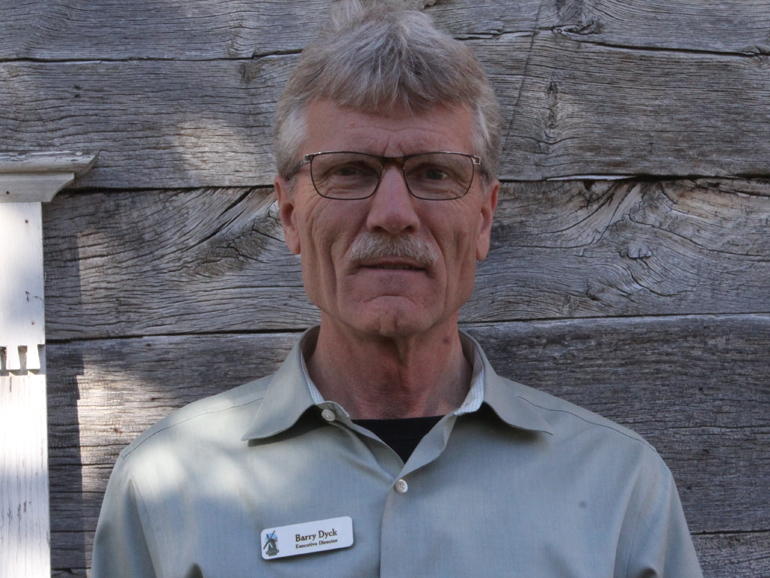After ten years as Executive Director at Mennonite Heritage Village in Steinbach, Barry Dyck is ready to spend his time on hobbies, rather than preserving artifacts. Dyck retired from the museum last week, replaced by Gary Dyck.
Dyck says ten years ago when he sought the role of heading up the museum, there were a few reasons why the position interested him. For starters, he says change looked attractive. It was different from what he had been doing the previous 30 years, and Dyck welcomed the new challenge.
Not only that, but Dyck says he was starting to appreciate history at the time, specifically Mennonite history. And, when you add the fact the museum presented a rural setting for this farm boy at heart, it was a perfect fit.
Dyck says two important construction projects standout as highlights for him from the past ten years. He recalls shortly after arriving at the museum, speaking with Curator Roland Sawatzky about restoring the Waldheim House. This was the first building to arrive at the museum and is also the oldest building on site. A log structure, Dyck says it was in desperate need of repair. After years of research and fundraising, the restoration was completed in 2017.
Around that same time, the museum embarked on a large fundraising campaign in an effort to raise $3 million. Part of those funds would be set aside to pay for construction of a summer pavilion. Dyck says the pavilion was needed because, as he recalls, each spring they would erect an old tent on the grounds and almost every summer, storms would tear it down. The $1.3 million pavilion opened in 2017.
But Dyck says highlights also include engaging with community members, staff and volunteers.
According to Dyck, there is a level of satisfaction he leaves with, knowing the museum's finances are in a much better position today than ten years ago.
"I think the community perspectives on the museum were not particularly healthy ten years ago," admits Dyck. "I think they are much healthier now from what I'm told."
But he says the financial health of the museum will always be a challenge. For example, there are 17 very old buildings on that site that all need extra TLC. They need paint and roof repairs on a regular basis. The grounds are also home to several large commercial buildings which require a lot of care.
"We should never rest and say, 'the financial woes of MHV are in the past'," he says. "The museum will continue to have to work really hard at sustainability."
What does the future hold for MHV? Will the museum become irrelevant in the near future?
"Just opposite, I think the relevance of the museum will grow," says Dyck. "There is a substantial vision at MHV at this point to understand relevance and to build relevance in the community."
According to Dyck, the primary mission of the museum is to collect artifacts and stories and to interpret history. But, he says that in itself is not relevant in any community. Dyck says there needs to be other elements to attract the public. One such attraction is the new pavilion. Dyck says it can help turn the museum into a community meeting place. He notes they also want to enhance their contribution to the education of children and young people in the community.
"I think there is a huge passion at the museum right now to substantially increase its relevance in our community," he says.
And with a new Executive Director in place, Dyck says the new boss will need to ensure the community views the museum as an important place to meet, learn, play and eat.
"The museum will do all those things and I think Gary will understand that," says Dyck. "I think these are critical elements to the future success of Mennonite Heritage Village."
So, what will occupy Barry Dyck's time, now that he will no longer be welcoming students to the museum as they step off the bus, or pointing visitors to the perogies and farmer sausage during Pioneer Days or interacting with visitors from various countries as they set eyes on the famous windmill for the first time?
"I'd like to make a garden again," says Dyck. "I'd like to read material that my mother left behind when she passed away back in 2013, her diaries and things like that."
Dyck adds he would like to spend time with his five grandchildren and eventually start volunteering.
"Maybe just maybe the museum will allow me to cut grass, ride their nice lawnmowers," he says. "That would probably be quite a delight."

















